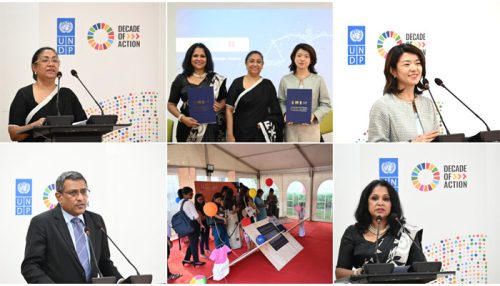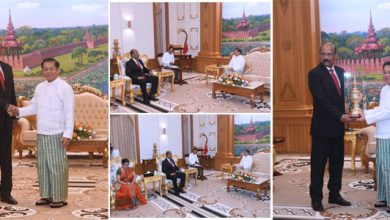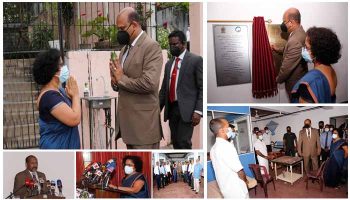UNDP spotlights women in the justice sector to commemorate International Women’s Day 2023
UNDP and Sri Lanka Women Lawyers’ Association join hands to improve access to justice to women

Technology and innovation has a tremendous power, and this has been evidently clear, especially since the onset of the COVID-19 pandemic and the current socio-economic crisis that Sri Lanka faces. However, it has also increased inequalities, abuse, and discrimination, especially for women and girls all around the world. It is essential that technology and innovation be used to bridge the gender gap and leverage its potential to increase women’s participation in transforming society and the wider economy.
The United Nations Development Programme (UNDP) in Sri Lanka together with the Sri Lanka Women Lawyers’ Association (SLWLA) held a discussion in line with the International Women’s Day theme for this year, ‘DigitALL: Innovation and technology for gender equality’, with the participation of key partners of the legal fraternity, development sector and UN agencies, to raise awareness on the increased gender digital divide, challenges with cyber harassment and the importance of access to justice for women facing cyber violence.
Delivering the keynote address at the commemorative event, Hon. Justice Her Ladyship Kumuduni Wickremasinghe, Judge of the Supreme Court of Sri Lanka said, “Considering the rampant nature of cyber harassment targeting socially vulnerable groups such as women and young girls, it is vital that the legal system of any country is adequately equipped.”
Also speaking at the event, Mr. Suhada Gamlath PC, Chairman of the National Authority for the Protection of Victims of Crime and Witnesses noted, “We must work together to create a pragmatic process to bring solace to women and children and protect them within existing legal spheres”.
Highlighting the role of technology on women’s rights, Ms. Ruchira Gunasekera, President of the Sri Lanka Women Lawyers’ Association noted, “the transformative power of the internet needs to provide equal opportunities to improve lives of both women and men. Ensuring safety in the digital space is crucial, as access to the internet is increasingly recognized as a fundamental human right that leads to the empowerment of women”.
UNDP also marked the occasion by entering into a partnership agreement with the SLWLA, the apex professional network established exclusively for women lawyers, to enhance the capacities of women legal professionals and to provide legal services to vulnerable women ensuring equal access to justice. The partnership is a part of UNDP’s flagship Support to Justice – JURE Programme, jointly implemented with the Ministry of Justice and UNICEF Sri Lanka, and funded by the European Union. With a membership exceeding 2,000 female lawyers from across the country, SLWLA aims to contribute to improving access to justice for women and children with its island wide network of women lawyers.
Speaking to the partnership, Ms. Azusa Kubota, Resident Representative for UNDP in Sri Lanka, stated, “With this partnership, we firmly believe that we can reach out to the most vulnerable women who are in need of effective legal guidance and assistance. I hope that through our partnership, the SLWLA will be in a better position to deliver systematic legal aid services to SGBV survivors at district and national level.”
The Support to Justice – JURE programme contains a holistic package to strengthen inclusive access to justice, improve transparency and accountability in the sector, and enhance quality and efficient services delivery, building on the ambitious justice reform agenda of the Ministry of Justice. With close attention given to foster access to justice for women and children, while supporting alternative dispute resolution mechanisms to deal with commercial matters through the potential of digital technologies to improve efficiency, the Programme hopes to pave the way towards an inclusive and just society in Sri Lanka.
Inspired by ‘What were you wearing?’ exhibitions from across the world, a curated trilingual exhibition displaying an array of clothing and first-hand experiences of survivors of sexual and gender-based violence in Sri Lanka was also on display for participants of the event. The exhibition focused on victim blaming and stereotyping of clothing given the prevalence of revictimization, and the need for informed awareness on the disconnection between clothing and the incidents of SGBV.






